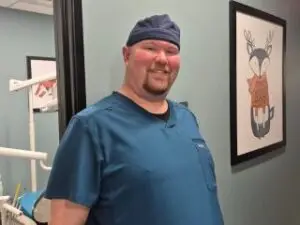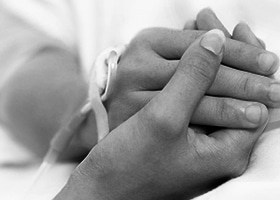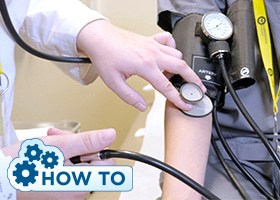 A new study published in the journal Anesthesiology found that continuous positive airway pressure (CPAP) therapy can potentially reduce postoperative complications in patients undergoing surgery that experience obstructive sleep apnea.1 Sleep apnea is an underreported and under-diagnosed problem that can cause many health problems both physically and mentally. The study is scaffolded on prior research suggesting? OSA increases the risk of postoperative complications.1 This research highlights not only the harmful effects of sleep apnea but also the general importance of good sleep habits. In the industry of pharmacy technology, some medical professionals are researching pills that could prevent sleep apnea, however, for the moment these drugs still require much testing.2 Currently, CPAP machines and mouth guards are the main treatments to mitigate sleep apnea.
A new study published in the journal Anesthesiology found that continuous positive airway pressure (CPAP) therapy can potentially reduce postoperative complications in patients undergoing surgery that experience obstructive sleep apnea.1 Sleep apnea is an underreported and under-diagnosed problem that can cause many health problems both physically and mentally. The study is scaffolded on prior research suggesting? OSA increases the risk of postoperative complications.1 This research highlights not only the harmful effects of sleep apnea but also the general importance of good sleep habits. In the industry of pharmacy technology, some medical professionals are researching pills that could prevent sleep apnea, however, for the moment these drugs still require much testing.2 Currently, CPAP machines and mouth guards are the main treatments to mitigate sleep apnea.
Sleep apnea
According to the Mayo Clinic, sleep apnea is a disorder in which breathing stops and starts while a person is sleeping.3 Obstructive sleep apnea is the common form of this disorder. Common symptoms of sleep apnea include:
- Regular daytime sleepiness
- Problem paying attention
- Loud snoring
- Difficulty remaining asleep, awakening regularly
- Morning headache
OSA is caused by muscles in the throat relaxing, which inhibits the airway and makes it more challenging to breathe. This causes a shortage of oxygenated blood flow. The brain senses this shortage and rouses the body briefly to reopen the airway. This can happen dozens of times each hour, and usually each rousing is so short it is not recognized by the person sleeping. Therefore, a person suffering from sleep apnea may not even be aware they are experiencing it. However, OSA prevents the body from reaching the desired phases of deep sleep.
Awareness week
Many people are likely unfamiliar of Sleep Apnea Awareness Week, which takes place from Oct. 6-13. It is sponsored by the American Sleep Association.4 The goal of the Sleep Apnea Awareness Week is to raise public awareness of the symptoms and potential complications of sleep apnea. As this disorder can present major health consequences, helping people identify and address this issue can better our national health. The study in the October issue of Anesthesiology, titled “A Matched Cohort Study of Postoperative Outcomes in Obstructive Sleep Apnea: Could Preoperative Diagnosis and Treatment Prevent Complications?” was published just in time to correspond with this annual event. Unawareness of sleep apnea is likely somewhat due to the relatively recent recognition of the disorder in the medical field. Since sleep apnea often goes undiagnosed, general public knowledge of the disorder is rather limited.
Surgery risks
Over one quarter of adults are estimated to have sleep apnea, making it a prevalent risk to those undergoing surgery as well as the public at large. Many researchers speculate the rise of OSA is associated with the obesity epidemic. The study found that use of CPAP treatment prior to surgery decreased postoperative cardiovascular difficulties by as much as 50 percent.1 OSA is a associated with a number of other severe health problems including obesity, diabetes, depression, hypertension, stroke, cardiovascular disease and cancer.5 In a news release, lead study author Dr. Thomas Mutter explains, “OSA [obstructive sleep apnea] is a common disorder that affects millions and is associated with an increased risk of surgical complications, but the condition often goes unrecognized.”6 The study compared the postoperative outcomes of more than 4,200 individuals that were diagnosed with OSA either before or after surgery.1 Scientists found that those with OSA were twice as likely to suffer from respiratory complications than those without the disorder, no matter if they underwent CPAP therapy or not.1 Furthermore, the team found that OSA patients treated with CPAP before surgery were less likely to experience cardiovascular complications. The press release accompanying the study estimates that of the 18 million people believed to have significant OSA in the U.S., 16 million are undiagnosed.6 1“A Matched Cohort Study of Postoperative Outcomes in Obstructive Sleep Apnea: Could Preoperative Diagnosis and Treatment Prevent Complications?” by Mutter, Thomas C. M.D., F.R.C.P.C., M.Sc.; Chateau, Dan Ph.D.; Moffatt, Michael M.D., F.R.C.P.C., M.Sc.; Ramsey, Clare M.D., F.R.C.P.C., M.S.; Roos, Leslie L. Ph.D.; Kryger, Meir M.D., F.R.C.P.C. Anesthesiology. October 2014. http://journals.lww.com/anesthesiology/Fulltext/2014/10000/A_Matched_Cohort_Study_of_Postoperative_Outcomes.14.aspx#P75 2“A pill for sleep apnea?” by Dina Bair. WGNtv.com, September 30, 2014. http://wgntv.com/2014/09/30/a-pill-for-sleep-apnea/ 3“Sleep apnea,” by Mayo Clinic Staff, Mayo Clinic, July 24, 2012. http://www.mayoclinic.org/diseases-conditions/sleep-apnea/basics/causes/con-20020286 4“Sleep Apnea Awareness Week – October 6 – 13” American Sleep Association. http://www.sleepassociation.org/sleep-apnea-awareness-week-october-1-7/ 5“Obstructive sleep apnea can cause a wide array of medical problems” by CLARK O. TAYLOR, M.D., D.D.S, Ravalli Republic, September 9, 2014. 6“New research suggests sleep apnea screening before surgery” press release. American Society of Anesthesiologists, September 23, 2014. https://www.asahq.org/For-the-Public-and-Media/Press-Room/Anesthesiology-and-Other-Scientific-Press-Releases/New-research-OSA-screening.aspx



